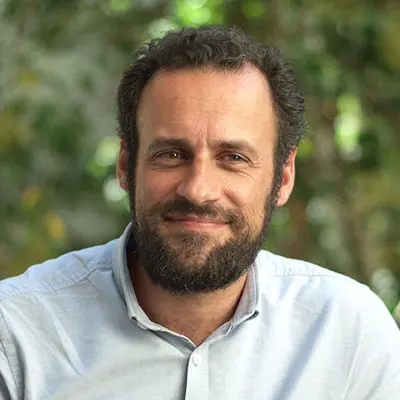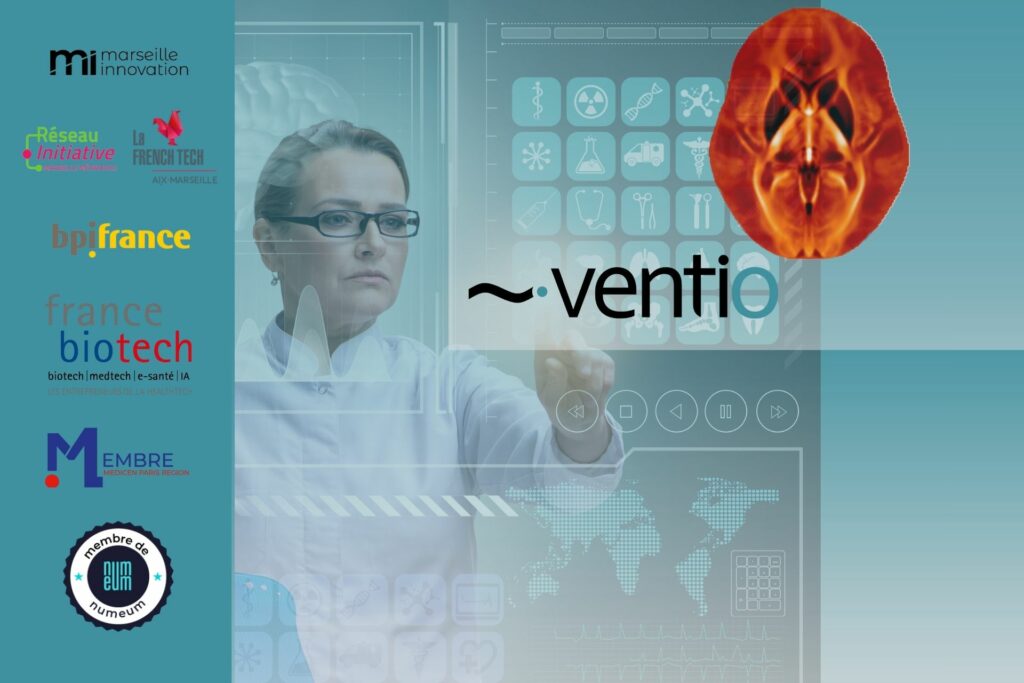Imaging services at the cutting edge of innovation and with very high added value
In March 2024 issue, “La Jaune & La Rouge” magazine interviewed our CEO Ludovic de Rochefort about Ventio’s expertise, the importance of sharing healthcare data to bring scientific research to the bedside, and the development potential of the QSM biomarker.
Credit Houda Gharbi – La Jaune & La Rouge
Special report: corporate life – Healthtech Magazine N°793 March 2024

Ludovic de Rochefort, founder of Ventio, tells us what led him to create this highly innovative company, which is also a continuation of his research work in medical imaging. He also tells us more about Ventio’s positioning, its offer and services, and its development opportunities.
What led you to create Ventio ?
As a digital health service company, I created Ventio to transfer the results of my research to the socio-economic world. I trained as an engineer and then became a researcher in medical imaging, specializing in magnetic resonance imaging (MRI). This is a particularly fascinating field, at the crossroads of physics and medicine, and one that often offers a number of application opportunities for radiology. What’s more, in the course of my work in France and the United States, I’ve been able to contribute to numerous partnerships between academic research, hospitals and HealthTech manufacturers. Building on these experiences and capitalizing on my training and expertise, Ventio was a natural and coherent choice to bring innovative solutions with impact to patients.
What public health issues are you addressing ?
To improve diagnosis of neurodegenerative diseases, and Alzheimer’s disease in particular, we need biomarkers. At the same time, there is a real need to identify new therapeutic targets and stratify patients in order to develop and monitor innovative brain therapies. In this context, recent scientific studies have extensively documented the phenomenon of cell death involving iron named ferroptosis. Many of them have also focused on analyzing and understanding the link between ferroptosis and age-related brain diseases. Now, we know that iron accumulates in certain deep gray matter structures in the brain. In some cases, abnormal accumulations of iron are also observed, which can occur at various stages of development. In view of these observations, the visualization and monitoring of iron in the brain represents a major challenge for medical and scientific research. To achieve this, it is important to be able to capitalize on advanced medical imaging modalities.
I was part of the team that developed a patented technology for quantifying tissue magnetism in vivo using MRI, Quantitative Magnetic Susceptibility imaging (QSM), which has been the subject of several thousand scientific publications. This QSM technology is now gradually being integrated into population-based studies, such as the UK Biobank, which will be able to provide answers when coupled with relevant clinical data.
What services does Ventio offer ?
Today, our offer is centered on the provision of digital services, including specialized SaaS software for research applications, based on QSM technology, for which we have exclusive distribution rights in Europe. We also offer expert services for defining imaging protocols on the systems used by our customers, carrying out quality controls, analyzing images according to need…
With its offer and services, Ventio targets pharmaceutical companies developing new brain therapies, as well as hospitals setting up multicenter studies on patient cohorts. At the same time, Ventio has been granted CIR status by the MESRI (French Ministry of Industry, Research and Innovation), which enables us to take part in outsourced R&D operations.
While innovation and R&D play a key role in your business model, Ventio won the French Radiology Society’s first prize for innovation in medical imaging in 2022. Can you tell us more about this aspect?
Over and above the initial services that the company has been marketing since 2023, Ventio’s value lies in its capacity for innovation and R&D. We also have a team of experts with multidisciplinary skills. These include Stéphane Roche, our Technical Director, who covers biomedical applications. Ventio is also heavily involved in research partnerships with leading laboratories and hospitals in these fields. This was notably the case for the QSM4SENIOR project, which was carried out with the Neurospin center (CEA) and whose aim was to obtain normative QSM values in normal aging.
In addition, Ventio was fortunate to receive the support of the Société Française de Radiologie through its Innovation Award. This distinction lends credibility and legitimacy to our approach of extending our services to become a medical device, with well-defined and validated clinical indications. This award, combined with the confidence of our Marseille Innovation incubator, Initiative Marseille Métropole and BPIFrance, is a real obligation.
To meet the challenges of innovation in the healthcare sector, we need to address the issue of data – how it is collected, valorized and made available to healthcare players, while respecting legal, technical and ethical constraints. How do you approach this issue?
Recent initiatives aimed at enabling the secondary use of healthcare data in warehouses, and which will progressively include imaging data, are destined to give us access to a formidable base of innovation. This data will necessarily lead to the definition of new regulations to protect individuals, which we must anticipate by capitalizing on skills development and training.
On the strategic side of information protection, we keep a close eye on technological developments, and pay particular attention to developing our skills in advanced digital tools, including AI and the cloud, which are also sources of innovation. Our services are also offered on a sovereign cloud. On the legal and organizational side, there is also a need for talent with multidisciplinary profiles. The team was fortunate to be strengthened by Noémie Vang, a legal expert who has also been trained in quality and information security management. By capitalizing on her skills, the idea is to implement, as far upstream as possible, a continuous improvement approach integrating the normative perimeter at stake. Finally, Stéphane Roche, who has long experience of translational research, will be part of the class of 2024 of the DESIU REDS (University Diploma in Health Data Reuse for Research), as we plan to use this route to demonstrate the medico-economic benefits of our solutions, in order to include them in patients’ care pathways.
Where are you today? Where are you focusing your development efforts?
Thanks to the current demand for our services and our nationwide network of partners, we are experiencing a dynamic of growth through innovation. At the same time, we’re strengthening our team and our industrial property assets, and we’re going to extend our financial partnerships in order to remove scientific and technical obstacles and thus achieve our medical objectives, given the societal challenges posed by neurodegenerative diseases.


